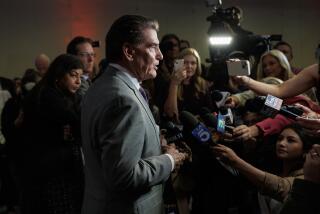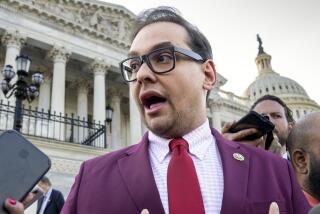Cranston Says He Has Trouble Paying Legal Fees
- Share via
WASHINGTON — Sen. Alan Cranston (D-Calif.), preparing to battle threatened Senate censure in the “Keating Five” case, said Tuesday that he is having trouble paying legal fees that have totaled more than $800,000.
By the end of last year, Cranston had raised $253,000 for a legal defense fund from friends, relatives and unions but had spent nearly all of it, according to the latest report filed with the Senate.
Cranston said in an interview that he has raised little since then, as total bills exceeded $500,000 for himself and $300,000 for “five or six” staff members who had to deal with the Senate Ethics Committee in the scandal.
“I am having difficulty paying the bills,” the senator said, adding that he is defraying expenses for aides because “I don’t think they should get stung.”
Cranston indicated in a financial disclosure statement last May that he is a multimillionaire. But his press secretary, Murray Flander, said the financial pinch is so bad now that Cranston himself is writing a key legal brief aimed at persuading the ethics panel not to take further action.
The role of Cranston’s lawyer, William W. Taylor III, “is not large at this point,” Flander added.
The Ethics Committee announced Tuesday that Cranston has waived his right to a further hearing. It said that he has promised to respond in writing by April 8 to the charge that he engaged in “an impermissible pattern of conduct” by intervening with federal regulators on behalf of Lincoln Savings & Loan while soliciting big contributions from its former owner, Charles H. Keating Jr.
The committee said it will decide after Cranston’s response whether to recommend disciplinary action by the full Senate. Sources have said the panel is inclined to urge some form of censure. But Cranston declared hopefully, “This is not necessarily going to the floor.”
Cranston was the only one of the “Keating Five” senators whose actions were judged to be in violation of Senate rules. He has protested being “unfairly singled out despite the evidence in all five cases.”
The committee found that actions of Sens. Dennis DeConcini (D-Ariz.) and Donald W. Riegle Jr. (D-Mich.) “gave the appearance of being improper” and that Sens. John McCain (R-Ariz.) and John Glenn (D-Ohio) had exercised poor judgment in assisting Keating.
The panel concluded there had been “substantial credible evidence” that Cranston engaged in improper conduct while soliciting $994,000 in political contributions from Keating during the mid-1980s while agreeing to intervene on his behalf with officials of the Federal Home Loan Bank Board, which was investigating mismanagement at Lincoln.
According to Senate records, donors who gave $10,000 to the Cranston Legal Fund Trust included Cranston’s sister, Eleanor C. Cameron, and her husband, Donald, of Los Altos, Calif.
Also giving that sum were the Teamsters Union, Sheet Metal Workers Union, Albert H. Gersten Jr. of Beverly Hills, Frederick R. Weisman of Los Angeles, Charlie O’Reilly of Santa Monica, M. L. Lawrence of Coronado, Calif., Jack Tramiel of Sunnyvale, Calif., Charles W. Davison of San Jose, Nathan Shapiro of Highland Park, Ill., and Frederick Mack, John H. Hobbs and Arthur Ortenberg, all of New York City.
More to Read
Get the L.A. Times Politics newsletter
Deeply reported insights into legislation, politics and policy from Sacramento, Washington and beyond. In your inbox twice per week.
You may occasionally receive promotional content from the Los Angeles Times.










